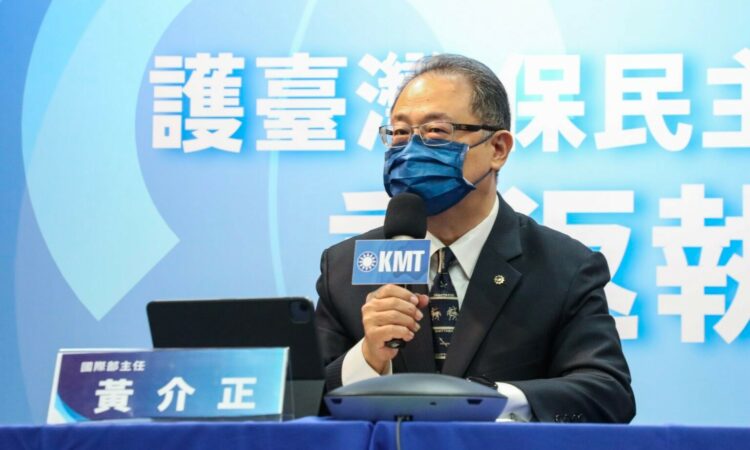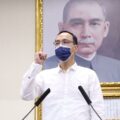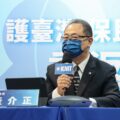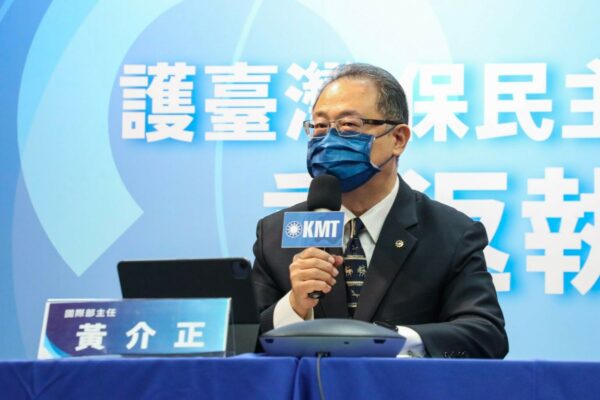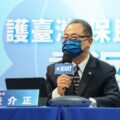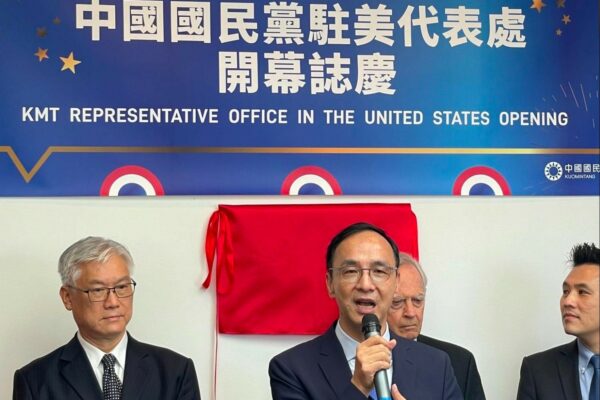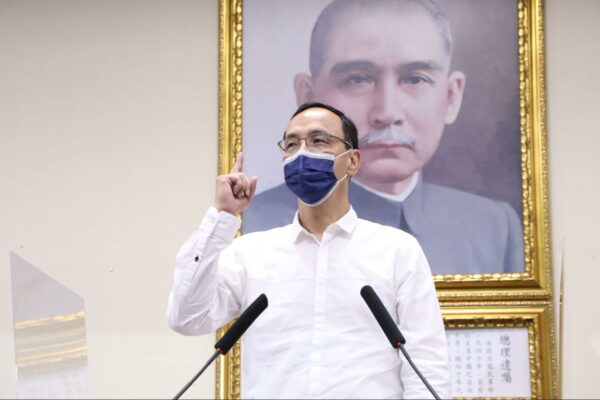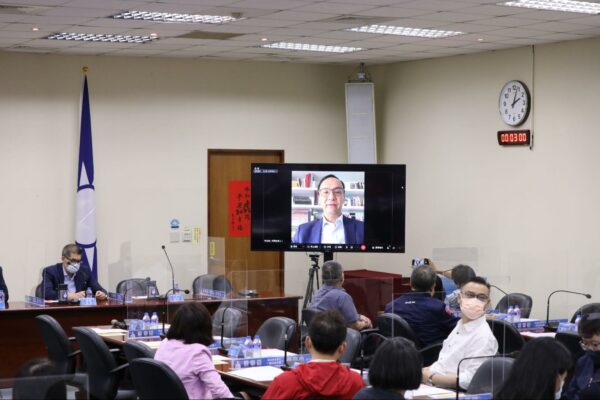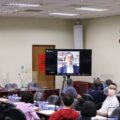
Today, Director Wang Yu-min of the Culture and Communications Committee, Deputy Director Wang Hung-wei, and Legislator Hung Mong-kai jointly convened a press conference entitled: “Plead for 3 Million Moderna Orphans: the Tsai Administration Should Stop Idling!” At this press conference, the conveners discussed the taxicab drivers of Taipei, New Taipei, Keelung, and Taoyuan, who have become so-called “Moderna orphans.” In other words, they had received the first shot of the Moderna vaccine but have not been able to obtain a second shot.
Chairman Lin Sheng-wen of the New Taipei City Taxicab Business Association and others involved in the taxicab industry also attended the press conference to express their concerns. The KMT indicated that Taiwan has, since early February, ordered 5,050,000 doses of vaccine from Moderna, yet only 1.5 million doses have arrived in Taiwan. The arrival rate of the Moderna vaccine is merely 29.7 percent, yet the government has continued to sit idly by and do nothing. Most of our citizens in Taiwan who have been vaccinated with Moderna have relied on United States donations; at the moment, amongst those who have gotten their first dose, there are still 3.8 million who cannot get their second. Confronted with this major shortage of Moderna, the government plans to employ the Medigen vaccine as a substitute for a second dose of Moderna, which has triggered an intense backlash from the people. The administration of President Tsai Ing-wen should urge Moderna to deliver vaccines more quickly and refrain from forcing the people, who are under pressure from decreasing vaccine effectiveness, to mix their vaccines with Medigen.
The KMT indicated that the taxicab drivers who were vaccinated on July 2 will soon surpass the time frame to get a second dose announced by the Central Epidemic Command Center (CECC), but there has been no relevant progress on a second dose. Furthermore, there is no sign of efforts by the Ministry of Transportation and Communications (MOTC) to coordinate with the CECC for a second Moderna dose. This situation has caused the 35,000 taxi drivers vaccinated via the MOTC project to become “Moderna orphans.” Those in the taxicab industry are not only worried that they will be unable acquire sufficient protection from the virus, but they are also even more worried that their livelihoods will be directly impacted. The KMT therefore called upon the relevant government agencies to take action as quickly as possible.
The KMT also questioned why Minister of Foreign Affairs Joseph Wu and Secretary-General Wellington Koo of the National Security Council did not take the opportunity to push the U.S. government and Moderna, Inc. for faster vaccine deliveries when they visited the United States to attend a “special channel” meeting. Confronted with incipient domestic shortages and broken supply chains of second doses, the DPP government is not the least bit concerned with the delivery rate of the vaccines it procured itself. The KMT emphasized that the Delta variant has already led to the occurrence of rapidly worsening cases among young people in the US whose vaccination rates are low. Elderly people, who are already more susceptible to grave medical conditions, have higher vaccination rates in the US, so their total death counts are lower. In order to prevent our domestic pandemic situation from going down the same dangerous path, Taiwan must also increase vaccination rates as quickly as possible and should not prolong the time frame of second doses of vaccine, which would influence the level of protection for the vaccinated. Taiwan should also avoid allowing more medically susceptible groups from becoming exposed to high risk again.
The KMT stated that when compared to the South Korean government’s proactive and effective snapping up of Moderna, the Tsai administration looks even more obviously passive. Taiwan had already signed a contract with Moderna for 5.05 million doses of vaccine back in early February, yet half a year later, less than 30 percent of those doses have arrived. Did the Tsai administration even try to get shipments more quickly during this time period? The administration has merely stated that it won’t eliminate the possibility of extending the time frame between the first and second doses, which might eliminate any degree of protection. President Tsai has stated that her administration has pushed for faster deliveries with all available means, and Commander Chen Shih-chung has also stated that he is willing to take any action necessary, but it has been over a month since our last vaccine shipment on August 15. Where are the government’s concrete actions?
By contrast, on August 9, when the South Korean government learned that only half of the 8.5 million doses of vaccine that Moderna had originally intended to ship to South Korea had arrived, the South Korean authorities immediately planned to send a delegation to the US to discuss the matter. On August 13, they sent four officials to the Moderna headquarters in the United States to strongly protest, and Moderna apologized and promised that 7 million doses of vaccine would be delivered before the first week of September. On September 7, Moderna had already delivered 8.15 million doses, resulting in a delivery rate of 95.88 percent and in excess of the amount originally promised for early September. The South Korean government, within a time frame of less than a month, was able to expedite the shipment delivery rate to almost 100 percent. The KMT indicated that anyone with eyes to see knows whether or not the South Korean delegation to the US was effective in expediting the shipment.
The KMT emphasized that globally, the population that has been completely vaccinated stands at about 30.3 percent: the United States is at 54.4 percent, Japan is at 51.1 percent, and South Korea is at 38.8 percent. Yet, the percentage of Taiwan’s population which has been completely vaccinated stands at merely 4.4 percent, causing us to fall among the lowest ranks. The South Korean government was extremely dissatisfied with its vaccine shipment rate being at only 50 percent. On the other hand, the Tsai administration has been idle and inactive; how can it expedite vaccinations for all of our people?
Furthermore, the international supply of vaccines is unstable, so there are still no clear-cut guidelines for mixing vaccines. South Korea went so far as to clearly state that it will not consider mixing vaccines at present; Taiwan should be even more careful about rushing to deprive our people of the right to choose their vaccines. Yesterday, the CECC confirmed that it had already begun conducting clinical trials on mixing Moderna and Medigen, which triggered an intense backlash from the people, called into question whether the government was forcing vaccines onto people to use up overproduced Medigen vaccines, and caused those vaccinated with Moderna to move one step further towards becoming Medigen mixture lab rats. The KMT emphasized that the Tsai administration should not forcefully push for mixing vaccines with Medigen during this time of a second dose Moderna shortage. The administration should also not ignore the people’s right to vaccine choice and should not evade the responsibility of failing to procure more Moderna vaccines.
